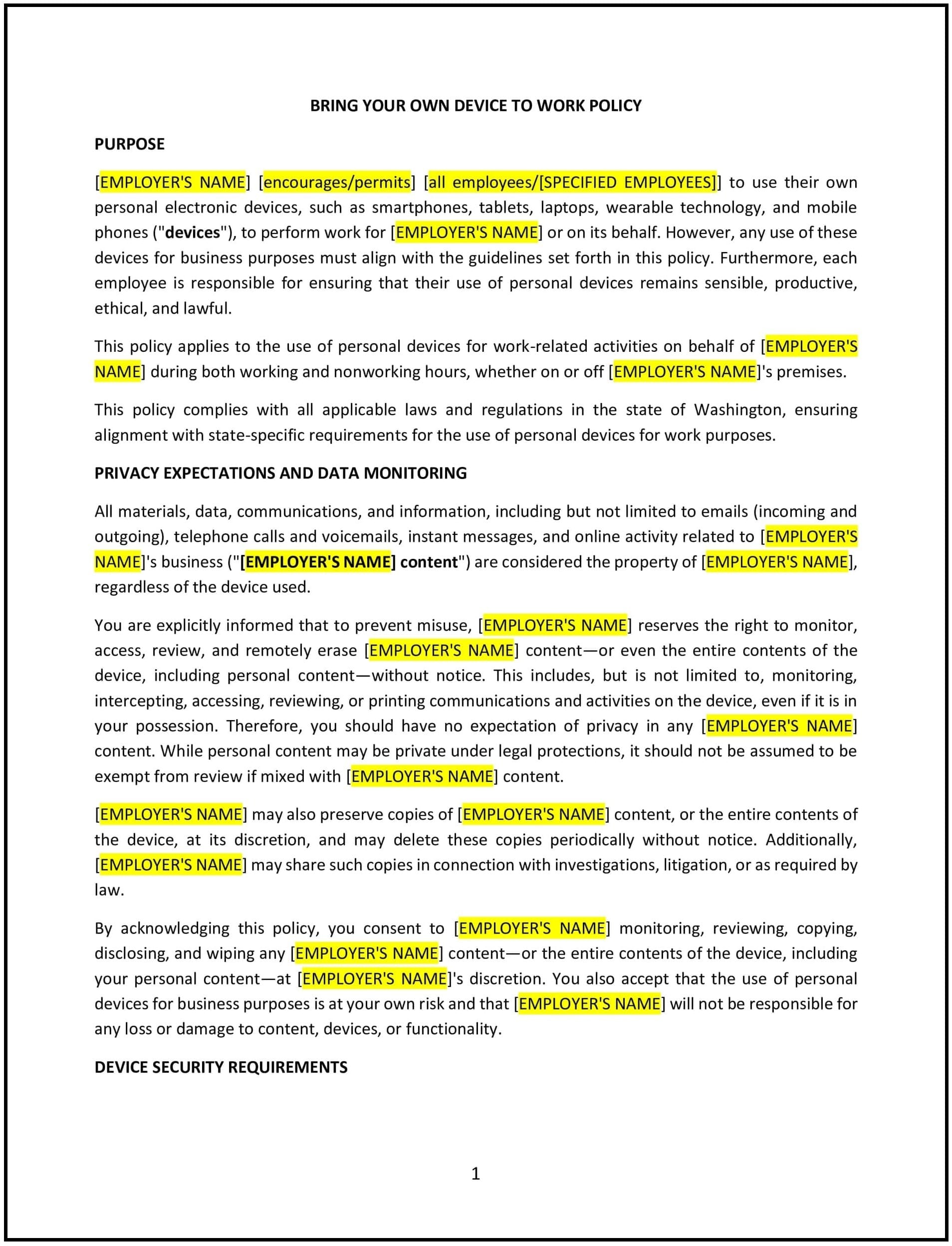Bring your own device to work policy (Washington): Free template
Got contracts to review? While you're here for policies, let Cobrief make contract review effortless—start your free review now.

Customize this template for free
This bring your own device (BYOD) to work policy is designed to help Washington businesses manage the use of personal devices in the workplace. The policy outlines the company’s expectations and guidelines for employees who wish to use their personal devices, such as smartphones, laptops, and tablets, for work purposes. It covers security requirements, acceptable use, and procedures for protecting company data, ensuring that both employees and the company are protected from potential risks associated with using personal devices at work.
By adopting this policy, businesses can allow employees to use their personal devices while ensuring data security, maintaining productivity, and complying with relevant legal requirements.
How to use this bring your own device to work policy (Washington)
- Define acceptable devices: Clearly outline which personal devices are permitted for use in the workplace, such as smartphones, laptops, tablets, or other electronic devices. The policy should also specify any restrictions on certain devices based on their security or compatibility with company systems.
- Set security requirements: The policy should specify the security measures required for personal devices used at work. This may include password protection, encryption, the installation of anti-virus software, and enabling remote wipe capabilities in case of theft or loss.
- Specify acceptable use: Establish clear guidelines for acceptable use of personal devices at work. The policy should clarify that devices should be used primarily for work-related tasks and that personal use should be minimized during work hours. It may also address issues such as internet usage, social media, and other apps that could interfere with productivity.
- Address company data security: Outline how the company’s sensitive data and information should be protected when accessed or stored on personal devices. The policy should require employees to follow company protocols for data storage, access, and sharing to avoid the risk of data breaches or leaks.
- Require compliance with company systems: Employees should be required to ensure that their personal devices are compatible with company networks, systems, and software. The policy may specify that certain apps or devices may not be used if they pose a risk to company security or performance.
- Set expectations for device management: Specify the company's expectations for the maintenance and management of personal devices used for work purposes. This may include updates, security patches, and software management to ensure devices remain secure.
- Address consequences for non-compliance: The policy should specify the consequences of failing to follow the BYOD guidelines, such as disciplinary actions, restricted access to company systems, or termination of BYOD privileges.
- Ensure compliance with Washington state and federal laws: The policy must comply with relevant laws, including Washington state’s data privacy and security laws, as well as federal regulations regarding workplace data protection, such as the Health Insurance Portability and Accountability Act (HIPAA) and the General Data Protection Regulation (GDPR), where applicable.
- Review and update regularly: Periodically review and update the policy to ensure it remains compliant with Washington state laws, federal regulations, and any changes in the company’s operations or technology needs.
Benefits of using this bring your own device to work policy (Washington)
This policy offers several benefits for Washington businesses:
- Increases productivity and flexibility: Allowing employees to use their personal devices can increase productivity and make employees more comfortable in their work environment by using familiar technology.
- Reduces costs: By allowing employees to use their own devices, businesses can reduce the costs associated with providing and maintaining company-owned devices.
- Enhances employee satisfaction: Many employees prefer using their own devices, which can increase job satisfaction and create a more comfortable work experience.
- Strengthens data security: By setting clear security requirements for personal devices, businesses can ensure that sensitive company data is protected from unauthorized access, theft, or loss.
- Complies with legal requirements: The policy helps the company comply with Washington state laws, federal regulations, and industry-specific data protection requirements, reducing the risk of legal penalties related to data breaches.
- Provides clear guidelines: The policy establishes clear expectations for both employees and the company, ensuring that everyone understands the rules and responsibilities related to the use of personal devices at work.
Tips for using this bring your own device to work policy (Washington)
- Communicate the policy clearly: Ensure that all employees are aware of the BYOD policy and understand their responsibilities when using personal devices at work. Include the policy in the employee handbook and review it during onboarding or at regular team meetings.
- Provide training on security protocols: Conduct regular training on security best practices for employees using personal devices at work. Ensure that employees understand how to protect company data and comply with security requirements, such as using strong passwords, encryption, and secure Wi-Fi connections.
- Monitor device usage: Regularly monitor the use of personal devices to ensure that they are being used in accordance with the company’s policy. This may include tracking device access to company networks, reviewing app usage, and checking for compliance with security protocols.
- Offer support for device management: Provide support to employees on how to manage their personal devices, including instructions for installing security software, updating devices, and ensuring compatibility with company systems.
- Enforce consequences for non-compliance: Ensure that employees are aware of the consequences for failing to comply with the BYOD policy, including disciplinary actions or revocation of BYOD privileges.
- Review and update regularly: Periodically review the policy to ensure it remains compliant with Washington state laws, federal regulations, and any changes in the company’s operations or technology landscape. Regular updates will help maintain the policy’s relevance and effectiveness.